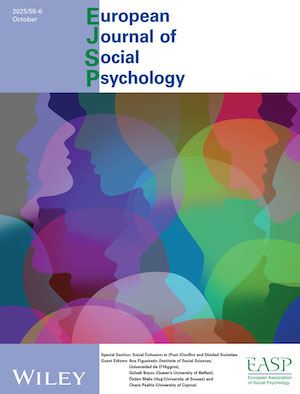Dans la même rubrique
- CEVIPOL
- FR
- Publications
- Articles
- Publiés en 2025
-
Partager cette page
Allies or Rivals? The Consequences of Ideological Distinctiveness and Social Recognition of Emergent Subgroups Within Social Movements
By Pauline Grippa, Paul Bertin, Olivier Klein, Laurent Licata

Abstract
Conflictual dynamics within social movements are an important factor impeding social change. These conflicts may be explained by the negative reactions of members of dominant subgroups within these movements to emergent subgroups that are ideologically distinct from them and that attract social recognition. In two pre-registered experiments (N = 2060), we examined how these characteristics—and their interaction—influence attitudes and cooperation intentions among members of the dominant subgroup and whether perceived competition over prototypicality and symbolic threat mediate these effects. Across both studies, when an emergent subgroup was perceived as ideologically distinct, it led to negative intergroup relations through both the perception of competition over prototypicality and symbolic threat. In contrast, perceiving a subgroup as attracting social recognition generally fostered positive intergroup relations, despite also heightening perception of competition over prototypicality. In addition, Study 2 showed that attracting social recognition surprisingly reduced the perception of symbolic threat, leading to more positive reactions. We discuss the nature of conflicts within social movements and potential mitigation strategies.
Mis à jour le 12 novembre 2025
